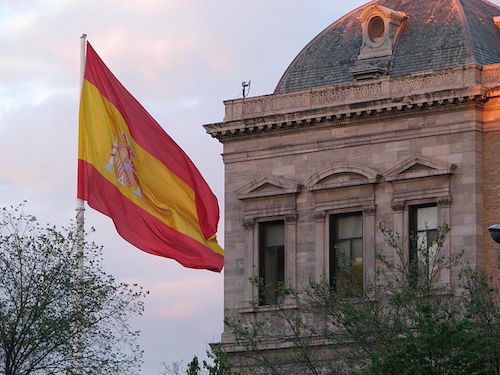9 Surprising Facts About the Spanish Language
There’s no doubt that Spanish has made its mark in the English-speaking world. Spanish-speaking pop stars like Jennifer Lopez, Shakira and Pitbull are well-known internationally; Mexican food can be found all over the globe; and anyone who’s seen an episode of Dora the Explorer can speak at least a couple words of español. But how much do you know about the Spanish language, beyond “hola”? Did you know that more people speak Spanish than English? Or that it’s an official language in 20 different countries? Whether you’re fluent in Spanish or you only know how to ask “dónde está el baño?”, here are some interesting facts you may not know about the second-most spoken language in the world.
 Image via beamillion / flickr
Image via beamillion / flickr
1. Spanish is the official language of 20 countries.
Spanish holds official language status in 20 countries, most of which are in Central and South America. It’s also widely spoken as a minority language all across the globe, in such diverse countries as the Philippines, Equatorial Guinea, and the United States.
2. In Spanish, there are two distinct ways of saying “Spanish”.
In Spanish, the words español and castellano both refer to the Spanish language. Although “castellano” literally translates to “Castilian”, a dialect of Spanish spoken in Spain, its meaning has evolved to encompass the language in its entirety. Typically, Spain and Central America use the term “español”, whereas South American countries use “castellano”.
3. Its grammar is governed by an official administration.
The Real Academia Española (Royal Spanish Academy) is an organization in Spain that keeps tabs on the language, and provides official guidelines for its usage. It was founded in 1713, and is responsible for adding new words to the dictionary. Some recent highlights include bloguero (blogger) and chatear (to chat online).
4. Spanish is heavily influenced by Arabic.
Spanish is a Romance language, which means that it derives from Latin. However, it’s strongly influenced by Arabic. For example, the word ojalá, which means “I hope” or “I wish”, derives from the Arabic wa sha Allah, which translates to “if God wills”. Other notable Spanish words of Arabic origin include aceite (oil), hasta (until), and azúcar (sugar).
 Image via Pixabay
Image via Pixabay
5. The letters “B” and “V” sound exactly the same.
Though “B” and “V” are quite distinct in English, the two letters sound exactly the same in Spanish. This means that basta (enough) and vasta (vast) are homophones.
6. Spanish is the language of the world’s top soap opera.
Mexico is famous for its telenovelas (soap operas), and as such, it’s home to the most successful soap opera ever, according to the Guinness Book of World Records. Betty la Fea (“Betty the Ugly One”) has been broadcasted in over 100 countries and dubbed into 15 languages. It’s also the original version of the English-language series Ugly Betty.
7. By 2050, the United States will have more Spanish speakers than any other country.
Currently, there are over 40 million Spanish speakers in the United States, and this number is only projected to grow. In fact, by 2050, experts estimate that the United States will contain more native Spanish speakers than any other country in the world, including Spain and Mexico.
How good is your Spanish? Find out by taking our free online Spanish level test!
8. Spanish is the second-most studied language in the world.
Currently, there are over 500 million people learning Spanish as a second language. This places Spanish right after English in terms of the languages with the most learners worldwide.
9. Words that contain all 5 vowels have a special name.
Words like murciélago (bat) and abuelito (grandpa) are unique in that they contain all the vowels in the Spanish language (a, e, i, o, and u). These words are called pentavocales (which translates to “five vowels”), and there are between 300 and 400 of them in total.
Even if you know how to make a mean burrito, we bet you didn’t know what pentavocales were!
Spanish is a beautiful and complex language, and there’s a lot more to it than the facts on this list. If you’re interested in learning more Spanish — including words that have fewer than 5 vowels — consider taking personalized Spanish classes from a qualified teacher. With 500 million other learners, you’ll certainly be in good company! Contact us to find out more information about learning the second-most common language in the world.


